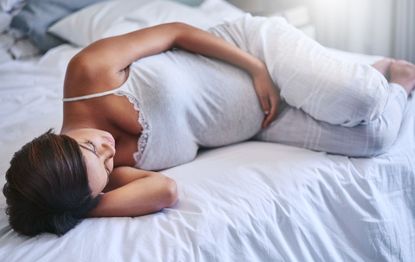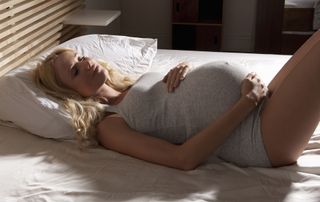Sleeping patterns could be linked to stillbirth, study finds


It turns out broken sleep while pregnant could actually be a good thing when it comes to the health of your baby.
Scientists at the University of Michigan, USA have suggested that the quality of a pregnant mum's sleep could affect their risk of having a stillbirth.
The study specifically found that those who sleep for more than nine hours per night during pregnancy could be at a higher risk of experiencing a late stillbirth.
However, results suggest that it could help to prevent stillbirth if expectant mums wake up in the middle of the night.
‘Pregnant women often report waking up and getting up in the middle of the night,’ said Louise O’Brien, lead author of the study at Michigan Medicine.
‘While multiple awakenings during the night may concern some women, in the context of stillbirth it appears to be protective.’
Women who are early risers may find it easier to get pregnant
GoodtoKnow Newsletter
Parenting advice, hot topics, best buys and family finance tips delivered straight to your inbox.
Louise explained that this is to do with how the autonomic nervous system and the hormonal system are regulated in late pregnancy during times of rest.
She outlined that blood pressure is at its lowest during sleep but when someone suddenly wakes up there is a rise in the nervous system activity that provokes short-term blood pressure peaks.
‘It’s possible that these brief increases in blood pressure are able to prevent long periods of relatively low pressure,’ explained Louise.
‘This is important because low blood pressure has been linked with fetal growth problems, preterm birth, and stillbirth.’

However, she did clarify that more research is needed into the relationship between maternal sleep and the risk of stillbirth.
The study leader warned that mums-to-be should not intentionally be waking themselves up during the night because historic evidence has suggested that disrupted sleep could be linked to pregnancy issues such as growth restriction and preterm growth.
‘Our findings add to research indicating that maternal sleep plays a role in fetal wellbeing,’ said Louise.
‘Studies aiming to reduce stillbirths should consider maternal sleep as this is a potentially modifiable risk factor.
‘Understanding the role of maternal sleep may help us identify interventions that would put us in a better position to advise women.’

Aleesha Badkar is a lifestyle writer who specialises in health, beauty - and the royals. After completing her MA in Magazine Journalism at the City, the University of London in 2017, she interned at Women’s Health, Stylist, and Harper’s Bazaar, creating features and news pieces on health, beauty, and fitness, wellbeing, and food. She loves to practice what she preaches in her everyday life with copious amounts of herbal tea, Pilates, and hyaluronic acid.
-
 Staying together 'for the kids' can have damaging consequences - divorce therapist explains 3 reasons why
Staying together 'for the kids' can have damaging consequences - divorce therapist explains 3 reasons whyThree major consequences of staying in a failing relationship have been identified - we share what they are, and why staying together can be more damaging for your children.
By Lucy Wigley Published
-
 Record number of families opt-out of claiming child benefit, but the decision could have serious repercussions for your future
Record number of families opt-out of claiming child benefit, but the decision could have serious repercussions for your futureStark warning for families as number of parents who opt-out of receiving child benefit reaches 10-year high
By Sarah Handley Published